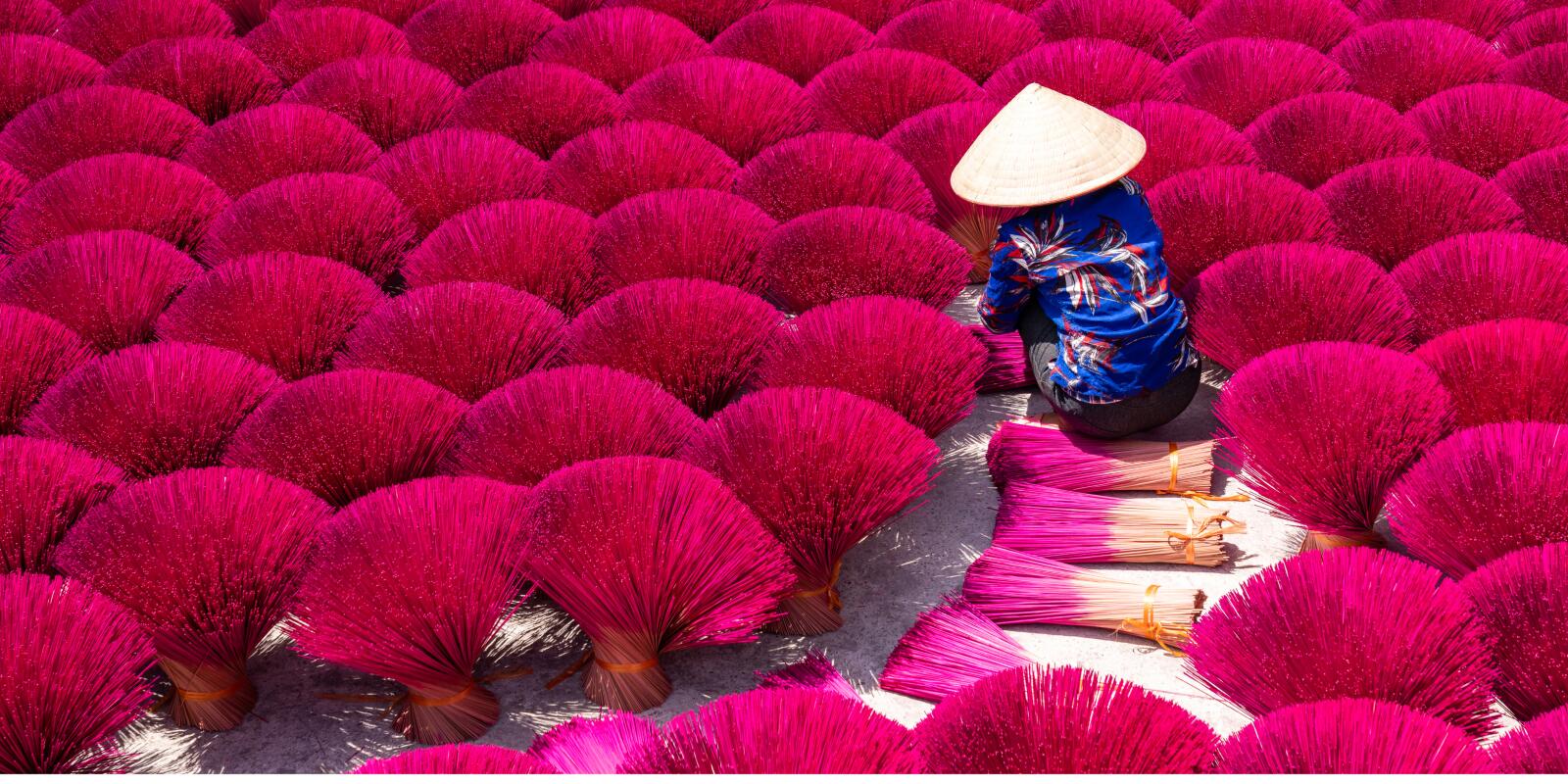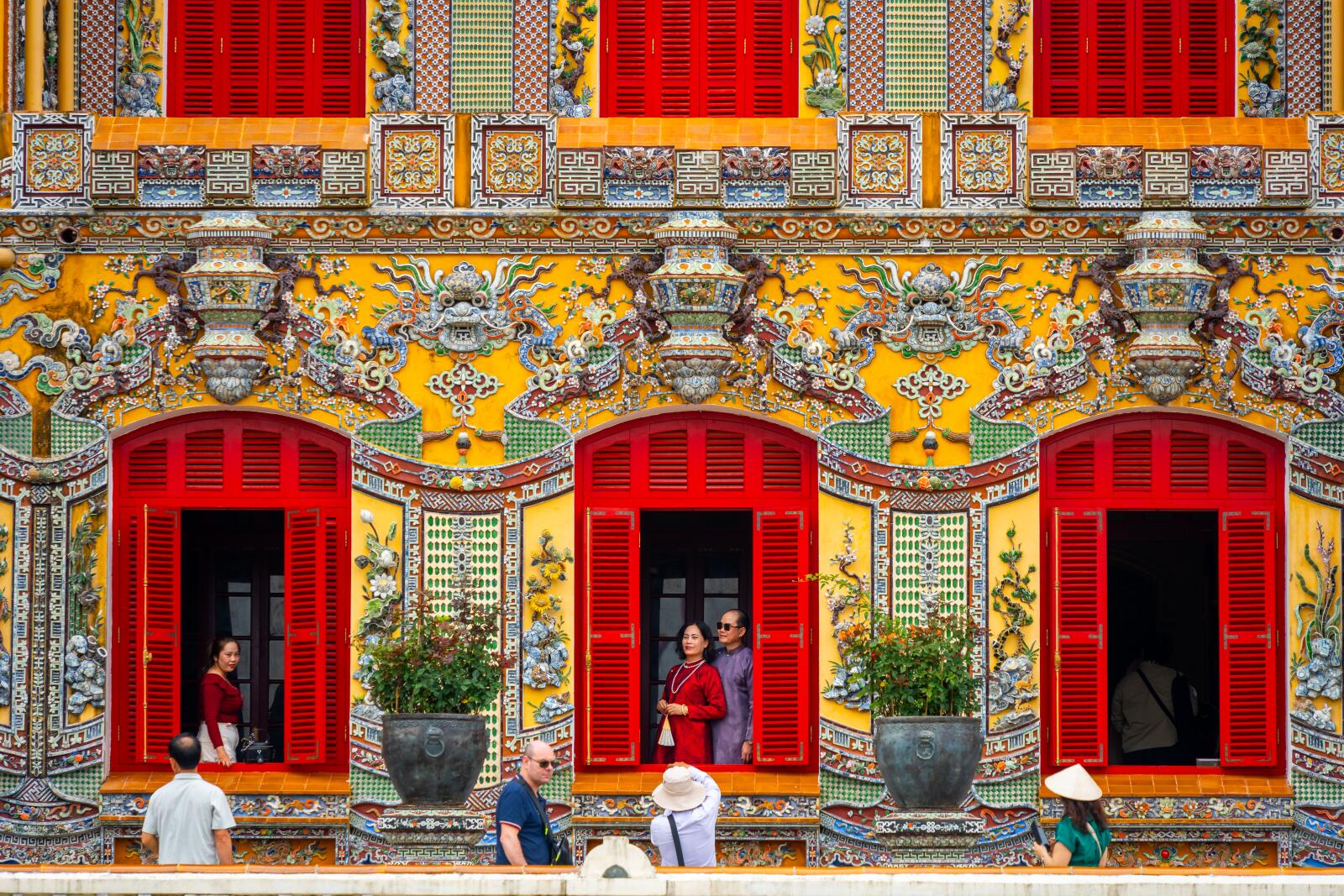Vietnam Culture & History
Vietnam's culture is woven together from thousands of years of history, shaped by dynasties, colonial influence and traditions. It is a country where modern life blends effortlessly with ancient customs, creating an experience that is both familiar and deeply unique. It is a country where modern life blends seamlessly with ancient customs, creating an experience that is both familiar and unique. From sacred temples and heritage towns to vibrant markets and artistic celebrations, Vietnam's cultural story is one of strength, creativity and connection.

Historical Timeline
Early Vietnamese Civilisations (Before 1000 CE)
The earliest Vietnamese communities were the Lac people of the Red River Delta, known for advanced rice farming and organised tribal society. Around 300 BCE, the Dong Son culture emerged with skilled bronze work, seafaring trade and agricultural innovations that shaped the foundations of Vietnam's early civilisation.
Chinese Rule (111 BCE - 938 CE)
For nearly a thousand years, Vietnam was under periods of Chinese rule. During this time, the Vietnamese adopted elements of Confucianism, Taoist traditions and administrative systems, while also resisting full assimilation. These centuries shaped early Vietnamese identity, blending imported ideas with local culture and strengthening a growing sense of independence.
Imperial Eras (939 - 1800s)
After Vietnam regained independence in 939 CE, a succession of dynasties shaped the country's early identity. These rulers strengthened agricultural systems, expanded the nation's territory and built citadels, temples and cultural centres that still stand today. Thang Long (modern Hanoi) emerged as the political heart of the kingdom, and by the early 1800s the Nguyen Dynasty had established its royal capital in Hue, marking the final chapter of Vietnam's imperial age.
French Colonial Period (Mid-1800s - 1945)
Beginning in 1857, France gradually took control of Vietnam and later formed French Indochina, which encompassed Vietnam, Laos and Cambodia. Colonial rule introduced European architecture, Catholic churches and new education systems, blending Western influences with local traditions and creating a distinctive cultural mix that is still visible today.
Division and the Vietnam War (1954 - 1975)
When French rule ended in 1954, Vietnam was split into two separate states, one in the North and one in the South. The opposing political systems quickly escalated into a long and destructive conflict known as the Vietnam War. North Vietnam and the Viet Cong fought against the South Vietnamese government and its primary supporter, the United States. The war concluded in 1975 when Northern forces gained control.
Reunification and Doi Moi (1976 -Today)
Vietnam became a single nation again in 1976, forming the Socialist Republic of Vietnam. A decade later, the government introduced Doi Moi, a series of reforms that opened the economy, encouraged private enterprise and modernised the country's development path. These changes helped transform Vietnam into one of Southeast Asia's fastest-progressing nations.
Modern Vietnam
Today, Vietnam is a lively and rapidly evolving country where tradition and modern growth coexist. From thriving cities to cultural festivals, the nation continues to build on its history while welcoming new ideas, making it an exciting destination for travellers.

Cultural Highlights
Temples and Pagodas
Across Vietnam, temples and pagodas sit at the heart of spiritual life. These places of worship range from colourful riverside shrines to ancient wooden pagodas tucked into hillsides. Many have stood for centuries, shaped by Buddhist and folk beliefs, and are known for their peaceful courtyards, incense-filled halls and detailed artwork. Visiting them offers a quiet moment to connect with Vietnam's longstanding spiritual traditions.
UNESCO World Heritage Sites
Vietnam's UNESCO World Heritage sites highlight the country's rich and varied past. Hoi An Ancient Town preserves a blend of Japanese, Chinese and Vietnamese influences in its charming old streets. Hue's Imperial City showcases the legacy of the last royal dynasty through grand walls, palaces and ceremonial spaces.
French Influence
French presence in the 19th and early 20th centuries left a clear mark on Vietnam's cityscapes. Many neighbourhoods still feature tree-lined avenues, pastel-coloured villas and striking colonial landmarks. You can see this influence most strongly in places like Hanoi's French Quarter, Da Lat's alpine-style buildings and Ho Chi Minh City's grand churches and civic structures. The contrast between European design and local culture creates a setting that feels uniquely Vietnamese.
Traditional Arts and Festivals
Vietnam's artistic traditions remain deeply woven into everyday life. Travellers can enjoy local performances such as water puppetry, folk singing and traditional dance, each with its own regional style. Handcrafts like lacquerware, embroidered textiles and calligraphy continue to be made using age-old techniques. Major celebrations, especially Tet, the Lunar New Year, and the Mid-Autumn Festival, fill towns and cities with parades, lanterns, offerings and vibrant community gatherings.
A Living Culture
Vietnam's culture is constantly evolving, shaped by both its history and the rhythm of daily life. It's a place where centuries-old temples sit comfortably alongside trendy cafés, and traditional markets continue with the same lively spirit they've had for generations. Community remains deeply important, with family connections and respect for elders influencing everything from daily routines to social traditions.
Food also plays a central role in expressing this living culture. Meals are designed to be shared, balanced and nourishing, bringing people together across all ages. Whether it's a simple bowl of pho enjoyed streetside or a regional specialty prepared from family recipes, Vietnamese cuisine reflects stories of heritage, creativity and connection.
Connecting with the Past
Learning about Vietnam's history and culture helps travellers understand the values that shape everyday life. Traditions handed down over generations sit comfortably beside modern ideas, creating a culture where old beliefs and new perspectives work together. This blend of heritage and progress is part of what makes Vietnam one of the most intriguing and distinctive nations in Southeast Asia.
Discover the Heart of Vietnam
From ancient temples to colourful festivals and atmospheric old streets, every corner of Vietnam reflects a sense of pride and resilience. The country's spirit shows in small moments, shared meals, warm conversations, glowing lanterns and the welcoming nature of its people. Experiencing Vietnam is like stepping into a living story, one that stays with travellers long after their journey ends.
